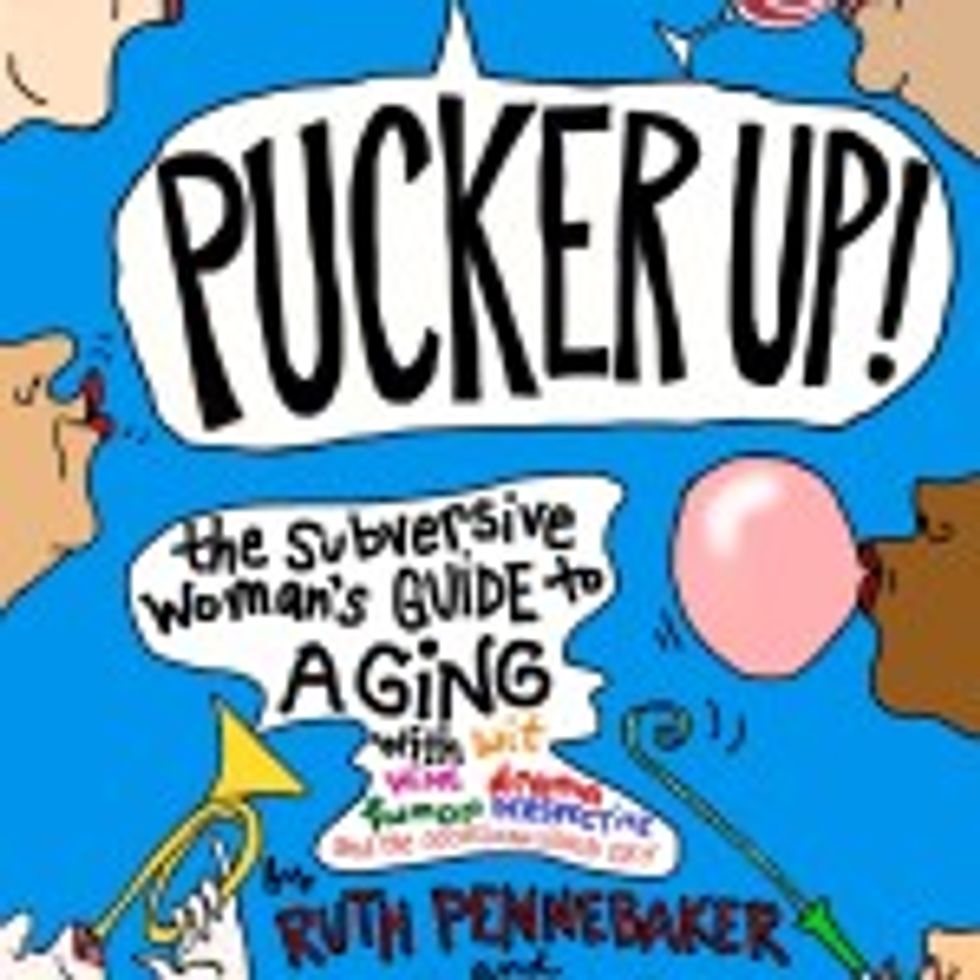A few years ago, I had the pleasure of turning a virtual friend into a "real" friend when fellow writer Ruth Pennebaker and her husband moved from her native Texas to New York City for a year. I found Ruth to be as brilliant and witty in person as she was on the page and after spending time with her, I always felt enriched and somehow smarter.

Q. You've written a young adult novel and a novel about three generations of women. You also blog and write opinion pieces. What inspires your writing?
A. This isn't a very attractive notion, but, to me, writing is like an itch I have to scratch. I write about what inspires me, what annoys me, what amuses me, what puzzles me. The world, both interior and exterior, is so crazy and challenging—how could I possibly not write about it? Maybe it's my way of staying sane.
Q. How did you come up with the idea for your latest humor book, Pucker Up!? Just the title makes me laugh.
A. Don't you love the word "pucker"? It sounds so funny and edgy to me. And I love [illustrator] Marian Henley's variety of women's lips puckering up. It also is a fairly apt description of my skin tone these days.
Where did i get my idea? Mostly by looking in the mirror.
Q. Let's be serious for a moment. How do you really feel about aging? What is the biggest challenge of aging as you see it?
A. At one point or another, I think I've felt every emotion about aging—amusement, fear, contentment, a sense of accomplishment, dread.
Like you, I'm a breast cancer survivor who thought she wouldn't live to grow old or see her kids grow up. Like you, I've lost so many dear friends to cancer who never got to grow old. I think of them so often when I'm kvetching about my aches and pains and sags, and I try to remember I am aging for women I was close to who never had the privilege to turn 60 or even 50. I want to do it well for all of us, and I want to remember that aging is a privilege. I can't claim I'm able to maintain that kind of high-mindedness all the time, but I do try.
Q. There is definitely humor in your book and the way you see things. But underneath it all, there is also the realization that things do change with aging, and with that, there's loss. How do you balance those two emotions in your writing?
A. I'm not sure any of us can balance them. We tilt, we stumble, we stand up straight, we balance—then, when we get a little too confident, we topple over and begin again.
I do want to be honest about aging, though. I'm annoyed by the constant chorus of reassurance that 60 is the new 40 (Oh, please. Are you kidding?) and you're only as old as you think you are. I want to appreciate this quieter time of life when the shadows are more slanted and the running of the world is passing to another, younger generation.
There's that sense of peace—and also a sense of loss. You lose people you love, you slow down, you lose skin tone, you even lose visibility in the outside world. I don't want to be continually mired in those losses, but I want to feel them and respect them, not pretend they're not there.
Q. The illustrations in the book are wonderful. Can you tell us about them?
A. Marian Henley, an artist, cartoonist, and author did the illustrations. Aren't they great? Marian and I have been friends for almost 20 years and had always talked about working together. Since, lo and behold, we seemed to be older than we once were, we decided to collaborate on a cheeky little book together. Marian has a real wild streak that I love—check out her outrageous drawing of a mini-skirted older woman later in the book.
Q. Do you believe in the adage that we should age gracefully and proudly display our wrinkles and other proofs of aging?
A. I wish I could decide! I was just in Paris and was greatly impressed with the magnificence and hauteur of the old there. They reminded me of some of the gorgeous, imposing buildings and monuments in the city—so unapologetic, so unconcerned with trying to look young. So un-American.
I, on the other hand, am very American, which you could tell the minute I opened my mouth and tried to speak French. I'd love to be magnificently and unapologetically old—but I'm not sure it's in my genes. I did learn to tie a scarf, though.
Q. If you didn't know how old you were, how old would you think you were?
A. Forty-ish.
About Ruth: In the past three decades, Ruth Pennebaker has written four novels, two humor books and hundreds of essays, newspaper columns, magazine articles and public radio commentaries. Her most recent novel is Women on the Verge of a Nervous Breakthrough, the story of three generations of women living under one roof. (She calls it "kind of a horror story.") She also blogs at www.geezersisters.com.Ruth lives in downtown Austin with her mad-scientist husband. They are the parents of an adult daughter and son and are looking forward to becoming grandparents in August.







